- Home
- Franklin Horton
Valley of Vengeance: Book Five in The Borrowed World Series Page 11
Valley of Vengeance: Book Five in The Borrowed World Series Read online
Page 11
Alice walked all the way to the front of the church and found the minister there dead, a red plastic cup just beyond his hand. It wasn’t communion. They did this on purpose. Except for the children, they had all chosen this. Alice turned back to the pews, imagining the dozens of families who’d sat there and made this decision. What had it been like?
“Why?”
She didn’t know why she asked it out loud. She didn’t even know why she asked it at all because she knew the answer. Considering what lay outside those doors, why wouldn’t you do it? Why would you want to be alive in this world? Why would you want your children to stay alive in it? It could get better in a few months or years but it could get a lot worse. Could you watch your children starve? Worse yet, what if you died and left your small children to fend for themselves in this cruel world?
“I’ve seen enough,” Alice said.
When there was no response, Alice looked for her mother and found her crouched at the altar rail. She’d blended in with the bodies, partly due to the low profile of her kneeling form, partly due to the red cup she now held in her hand. She was staring at the liquid, but Alice saw the cup inching closer to her mother’s own mouth, as if she were fighting the urge to resist but was losing.
“MOTHER!!!” Alice screamed.
Pat raised the cup to her mouth and tossed the liquid back as if she were a drywaller sucking down a shot of Jack Daniels at the neighborhood bar.
Alice screamed, dropped her revolver, and ran to her mother, grabbing her by the sleeve. “Spit it out!”
Pat stared blankly at her daughter but made no move to spit the liquid out. It was gone. Swallowed. Pat opened her mouth to show Alice.
Alice could not stop herself. She slapped her mother hard across the face. Then she jumped on her, forcing her back onto the carpet. She grabbed her mother by the cheeks, held her head back, and tried to force a finger into her mouth. Maybe she could make her throw up? Maybe it wasn’t too late. If she could just get it out of her.
Pat bit down on her daughter’s fingers. “Nooooo,” she hissed between her locked jaw. “Leave me…alone.”
“Mom!” Alice pleaded. “No. No!”
Pat’s eyes glassed over and her face flushed. Her body began to seize, mildly at first, then more violently. Alice had a hand on each of her mother’s shoulders now, staring at her, trying to come up with something she could do, but there was nothing.
Alice began crying, her tears rolling down her face and dropping onto her mother’s. Pat’s eyes were watering, but Alice couldn’t tell if it was from the poison or if she were crying too. When her mother began throwing up, Alice rolled off her and curled into a fetal position. She cried harder, violent sobs that rose into curses and screams.
She laid that way for a long time, even after her mother quit choking, then quit breathing. There was complete silence within the church. Alice felt like gravity was trying to pull her limp body through the wooden floor and down into the core of the Earth.
She thought there was nothing left that could be done to her but she was wrong. She thought her feelings were so pushed down within her that they were unreachable. That too was wrong. That one might reach a place where pain couldn’t hurt you was only a fantasy. Pain was infinite, inescapable, and sometimes as big as all the world.
Alice stood, feeling as if she were waking from a long, uncomfortable nap. She found her pistol and tucked it into her waistband. She looked around that gallery of death, then realized she was only torturing herself more by committing those scenes to memory.
She managed to pull her mother into sitting position on a pew, then maneuver her up onto her shoulder, staggering under the weight. The pressure of her shoulder pushing into her mother’s midsection made the body emit noises and gurgles that made her sound alive. Alice carried her out the double doors and onto the porch. She spun and kicked the door of the church closed, pushing with her foot as you might prod some vile thing that you didn’t want to touch with the flesh of your hand.
Alice’s chest heaved and she looked about wildly. She had a fleeting thought to burn the church to the ground. She knew that’s what needed to be done. What took place there needed to be cleansed from the Earth’s memory. She let go of her mother and quickly patted her pockets with her free hand, but could not find a lighter.
Groaning, she staggered down the steps, nearly losing her mother before she reached solid ground. She felt lightheaded, her knees wobbly. She got to the car and tried to lower her mother into passenger seat. The body was too heavy and she fell as she tried to slide her into the seat. She landed on her mother’s body, finding the contact both familiar and repellent at the same time.
She maneuvered herself back out, straightened her aching back, and sucked in air. Her heart was racing and she wiped sweat from her face with the tail of her shirt. She closed the door and felt her pocket for the keys. When she started the car, she drew the revolver and put it beneath her thigh. She stared at it for a moment, realizing more profoundly than ever that there were some acts of violence for which no vengeance could be taken.
She punched the gas, slewing the car around and heading for home.
Chapter 22
Alice
When Alice made it back to the farm, she parked in front of the house and looked over at her mother. She lingered there staring at her, imagining that she was just asleep and she would wake her up so they could go inside. The moment passed with the hard realization that no one was waking up from what was going on. Not the dead, and not the living. Alice got out of the vehicle and found her muscles stiff from having carried her mother to the car. She went inside the house and called for her son but he didn’t answer. He must not have finished with the grave.
After a short walk, she found him there, only his head showing above ground as he slung shovels of dirt into a pile. He was into the clay layers now and it was especially hard digging, the material clinging to the shovel when he tried to pitch it out. He was shirtless and his body was streaked with dirt. His hair and muddy jeans were drenched with sweat. He dug with unrelenting fury, gasping for breath because he refused to slow for any purpose. His hands, still not used to constant manual labor, were blistered and raw.
Alice approached and her shadow fell across him. He stopped then, leaning forward against the wall of the grave, his head resting on his forearm.
“I wanted to make it better,” he croaked. “I wanted to smooth the walls and square the corners.”
Unable to find words for what she needed to convey, she awkwardly spit it out, her voice breaking. “It will need to hold two.”
He raised his head and stared at her uncomprehendingly. The absence of his grandmother eventually told the tale and he uttered an exhausted wail. He sagged down into the hole, the clay and mud smearing his face, caking his hair.
“How, Mommy?” he asked. “How?”
“It doesn’t matter,” she said. She was back to being numb again, so battered by the world that a crust had reformed around her, a shell leathered by abuse and hardship.
Charlie was in a place where she couldn’t help him now. She was unable to share in his emotions, unable to empathize. She left him there, sobbing in the hole, while she drove the car to the graveside. It dragged on the farm road, scraping dirt as it straddled ruts. They found an old quilt in the back of the car and used it to wrap Pat. Alice had no more tears but Charlie sobbed and moaned in a manner she’d not seen since he broke his arm as a child.
Once Pat was settled into her resting place, they returned to the house for Terry. Alice had tried to load him when she’d gone for Pat but she’d been unable to budge his larger body. Even with the two of them it had proven nearly impossible. Charlie was scrawny, still child-like in his appearance. They’d been forced to drag Terry onto the porch, then use a wheelbarrow to get him to the car.
Halfway between the house and the grave, the car died.
“Tank’s empty,” Alice said. “It’s been beeping a warning for a while. Do
we have more gas?”
Charlie shook his head. “The tractor is diesel and it’s empty. The gas cans are empty. Everything with gas or diesel on this farm has already been siphoned.”
“There are a few vehicles at the church,” Alice said after a moment of thought. “Maybe we should check them for fuel.”
“That’s a long walk,” Charlie said. “Hours.”
“Where else do you have to be?”
They geared up and walked in mostly silence, reaching the church in around two hours.
“Are there people here?” Charlie asked upon seeing the horses and vehicles.
“It’s best we don’t talk about that,” Alice said. “To even tell you what happened in there will put images in your mind you’ll never get rid of. You’ve been through enough today.”
Charlie appeared to accept that. With all he’d gone through today, it was not like he was intent on subjecting himself to even more torment. When she told him there were things in there he didn’t want in his head, he yielded to her judgment.
“You didn’t mention horses,” he said.
“I didn’t think to mention them,” Alice replied.
They searched but none of the vehicles had keys. Alice found that odd. If you knew you were coming here to die, why would you bother taking the keys in with you? It had to be purely habit. Alice could not make herself go inside and go through the pockets of the dead trying to find them.
“Hand me the hose,” Alice said.
Charlie had a section of water hose they’d cut off. Each of them had brought an empty gas can. Alice took the hose, opened a gas cap, and tried feeding it into the tank. Something was blocking it.
“Damn it,” she said. “I can’t get it to feed in there.”
“Dad said that some vehicles have anti-siphon tanks,” Charlie said.
Alice quickly grew frustrated and tried another vehicle. There were only a few there and she quickly discovered that she couldn’t get the hose into any of them.
“We could try puncturing the tanks,” Charlie said.
Puncturing the tanks was a failure. She could tell from tapping them with her pocket knife that there was little gas in any of them. Only one had a plastic tank. She had Charlie find a cup for catching the gas while she twisted her pocket knife for several minutes, drilling a hole in the tank.
The only cup he could find was a Styrofoam cup with the name of a local convenience store printed on it. When Alice finally penetrated the tank and slipped the cup under the stream, it began to dissolve into a gooey mess. She tried to plug the stream with her finger while Charlie looked for something else to catch the gas. The gas ran down her arm and soaked her shirt. The vapors burned her eyes.
The more uncomfortable she became, the more she yelled at Charlie to find something. When he couldn’t, she let go of the hole and let the gas run into the ground. She rolled from beneath the car, cursing. She yanked her shirt off and tried to wipe the gas from her arm and back.
“I’m sorry, Mom,” Charlie said. He was upset, feeling like he’d screwed up.
Alice was still feeling numb and not completely in tune with her emotions. She understood, though, that she needed to comfort her son. “It’s okay. It wasn’t enough gas to make a difference anyway. Where would that much gas get us?”
Charlie didn’t answer. He was looking at the ground.
“It’s pointless. There’s probably not enough gas in there to even get the car started,” she spat.
“I’ll go inside if you want,” he said. “I’ll look for keys. We’ll find something we can drive.”
“Fuck the keys,” Alice said. As numb as she was, she’d shocked herself using profanity that way in her son’s presence. She took a deep breath. “Let’s see if we can get the horses. They are probably of more use to us, anyway.”
“At least we can grow their fuel,” Charlie said.
“They’re a little agitated,” Alice said. “Hungry, dehydrated, and sore from having these saddles on for who knows how long. They smell the dead. It may take a little while to calm them.”
“There’s water in the ditch by the road,” Charlie said. “Maybe a drink will make them feel better.”
It was early evening by the time they got the horses in a state where they could be ridden. Neither Alice nor Charlie had much experience with horses.
“We’re going to run out of daylight,” Alice said. “We need to get a move on.”
Seeing that neither of them knew anything about horses, they each selected a horse based on no particular criteria at all. They led the others, tying them in line.
“When we get home and finish our work, these horses will need care,” Alice said. “Put them in the barn so no one will be tempted to steal them.”
“Once we finish with… with Dad, I’d like something to take my mind off things. I’d rather be busy than laying around thinking about how bad this day sucks.”
“There are things we need to talk about. While I know the farm has come to mean a lot to you, I’m not sure the two of us can protect it.”
“What meant a lot to me was being there with Dad and Gran,” Charlie said. “Then you, when you got there. Without them, the farm just seems like a lot of work for nothing.”
“It’s easy to feel hopeless, Charlie. Trust me, I know,” Alice said. “You probably don’t care if you live or die right now, but remember we’ve got each other. That’s a reason to live. You’re the reason I’m alive. You’re the reason I fought to get home.”
“Fought?”
“Yes, fought. I’m not ready to talk about it now.” She didn’t know how he thought she got home but she assumed that he understood it had been a dangerous, violent trek. Maybe he didn’t. Maybe he thought it was just a long walk, like walking home from the school bus.
Charlie accepted her explanation with no questions. “Mom, whatever you want to do, I’ll do.”
“Even if it means leaving the farm?”
“Like I said, without Dad and Gran it’s just muddy fields full of animal shit.”
Alice couldn’t have agreed more.
Chapter 23
The Valley
Dinner in the valley was a social event most evenings. In fact, it was the only social event that occurred on a regular basis anymore. Everyone had work to do at their homes during the day, trying to prepare for winter or trying to make their powerless homes more comfortable. Dinner with the tribe was a chance to relax and share information as well as food. While winter still concerned them, the semi-trailers loaded with supplies that had been obtained from the interlopers from Glenwall had eased some of the immediacy of that concern.
The group of men had been part of a security force that protected an elite golf course community over in Wallace County. Somehow they got the idea that Jim’s valley was going to be their new bugout location. Jim had considered the group to be invaders and they’d been dealt with harshly. There were no survivors from that group. The trailers of food and supplies had been intended to get those men through the winter. Now they would serve the same purpose for Jim’s people.
Tonight, each family remained at home. After an initial downpour, the rain had slacked off some, but had now returned with a vengeance. It pummeled the roofs, sounding even louder without television to drown it out. There were bolts of lightning that flickered in the dramatic gray sky followed by thunder echoing down the valley in a way it only did in the mountains, sounding like boulders rolling down a sheet of tin. The families spoke on the radio and decided that none were eager to venture out into the wet evening. Everyone would stay home and take their meals with their own families.
Jim and Pete were setting the table. Jim did the plates, Pete the silverware. Napkins and paper towels were used sparingly now, with bandanas and handkerchiefs taking the place of table napkins.
“I hadn’t realized how much I missed this,” Jim said.
“Missed what?” Pete asked.
“Having a family night with just us.”
“Weren’t you the one preaching that group dinners were a more efficient use of resources?” Ellen asked.
“They are,” Jim said. “Doesn’t mean I like them better. That’s just a sacrifice I made to help the supplies last longer.”
The evening was much quieter than when the group was there eating. There was no banging of the large kettles they had to use when they were cooking for so many. There was no hum of a dozen different conversations. Kids were not yelling, or crying, or playing loudly through the house. Jim didn’t feel like he had to play host. Tonight it was just his family.
His mother’s mood had been brightened by the arrival of more of her own personal things. Like any good husband, Pops was in a better mood for having put Nana in a better mood. She now had her craft materials, her sewing box, knitting and crocheting supplies, and all of the other things that kept her entertained since she retired.
As befitting a damp and inhospitable evening, they were cooking chili made with freeze dried beef. Nana used a cast iron griddle on a camp stove to cook johnnycakes, a cornmeal flatbread she’d grown up eating. Ariel helped her make the batter and was scooping it out onto the griddle while Nana carefully flipped the cakes when they were ready. Pops was sitting in the living room by candlelight, scratching his dog behind the ears while Jim and Pete finished setting the table.
With no wind, the rain was still coming straight down. When he finished his task, Jim stepped onto the back screened-in porch to watch the rain. He felt like he was in a jungle hut watching the monsoon rains pour on the dense greenery. In the dark evening, the sound of the rain was powerful and began to make Jim powerfully sleepy. He eased down into an Adirondack chair and started to close his eyes for a moment when something caught his attention. He sat upright. He saw it again, a flicker of light in the distance. He only caught it for a moment, coming from a gap between two hills, and partially obscured by trees.
He pulled his radio from his pouch. Buddy and Lloyd were manning the watch tonight. The post on this side of the valley was not within sight of Jim’s house but was closer to the Wimmer farm. He was pretty sure they couldn’t see in the direction he was looking.

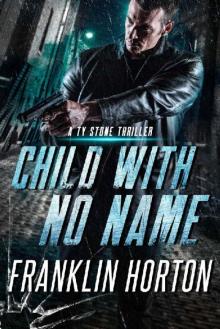 Child With No Name
Child With No Name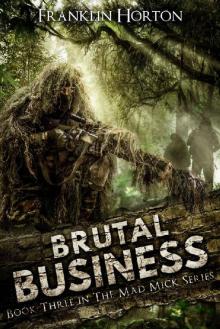 Brutal Business: Book Three in the Mad Mick Series
Brutal Business: Book Three in the Mad Mick Series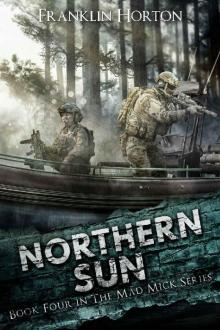 Northern Sun: Book Four in The Mad Mick Series
Northern Sun: Book Four in The Mad Mick Series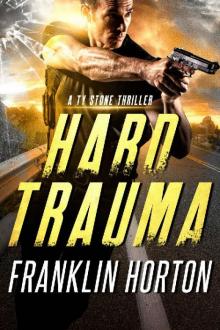 Hard Trauma
Hard Trauma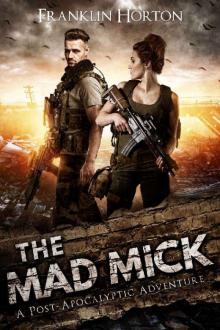 The Mad Mick: Book One of The Mad Mick Series
The Mad Mick: Book One of The Mad Mick Series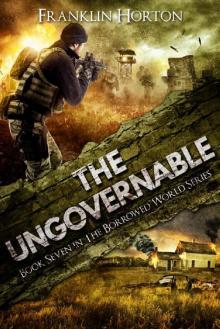 The Ungovernable
The Ungovernable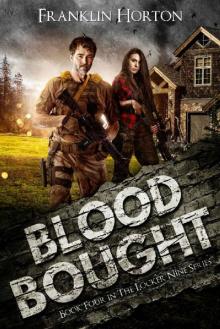 Blood Bought: Book Four in The Locker Nine Series
Blood Bought: Book Four in The Locker Nine Series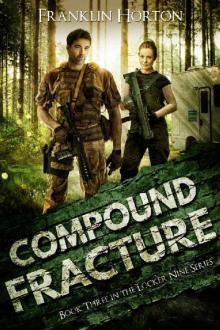 Compound Fracture
Compound Fracture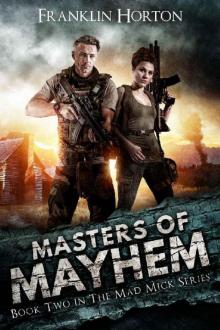 Masters of Mayhem
Masters of Mayhem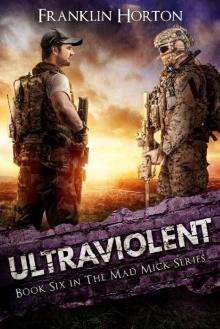 Ultraviolent: Book Six in The Mad Mick Series
Ultraviolent: Book Six in The Mad Mick Series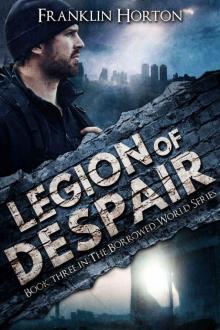 The Borrowed World (Book 3): Legion of Despair
The Borrowed World (Book 3): Legion of Despair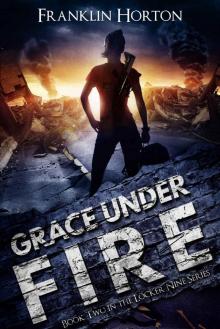 Grace Under Fire: Book Two In The Locker Nine Series
Grace Under Fire: Book Two In The Locker Nine Series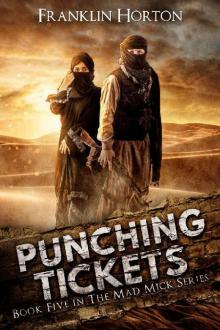 Punching Tickets: Book Five in The Mad Mick Series
Punching Tickets: Book Five in The Mad Mick Series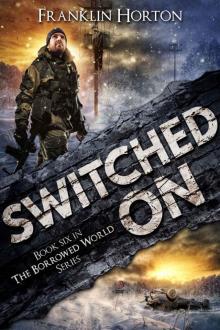 Switched On: Book Six in The Borrowed World Series
Switched On: Book Six in The Borrowed World Series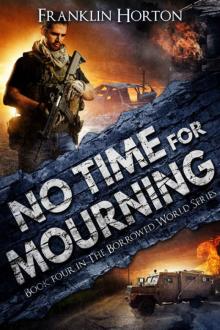 No Time For Mourning: Book Four in The Borrowed World Series
No Time For Mourning: Book Four in The Borrowed World Series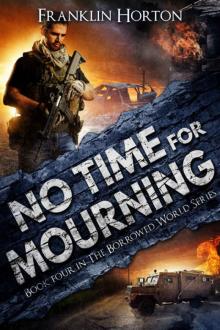 The Borrowed World (Book 4): No Time For Mourning
The Borrowed World (Book 4): No Time For Mourning Random Acts
Random Acts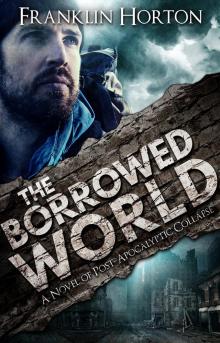 The Borrowed World: A Novel of Post-Apocalyptic Collapse
The Borrowed World: A Novel of Post-Apocalyptic Collapse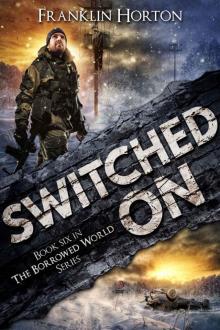 Switched On
Switched On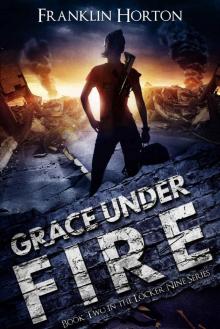 Grace Under Fire
Grace Under Fire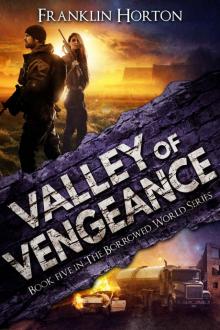 Valley of Vengeance: Book Five in The Borrowed World Series
Valley of Vengeance: Book Five in The Borrowed World Series